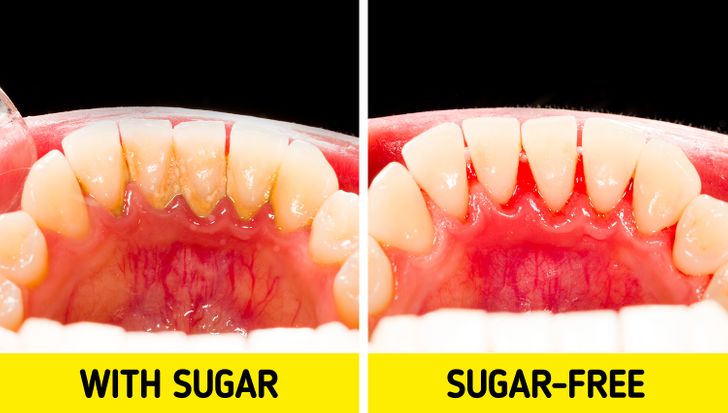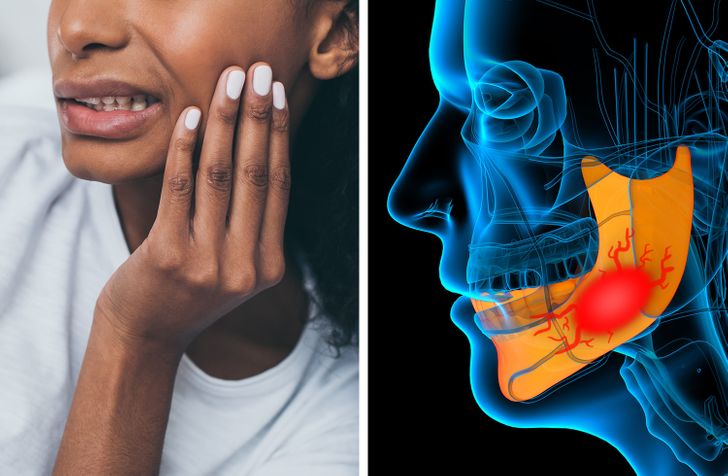After dinner I sometimes feel like I want something sweet, but I try not to eat candies because they are too high in calories. Instead, I chew some gum and feel better :)
8 Effects Chewing Gum Can Have on Your Body
Throughout history, people have chewed everything: from resin and paraffin wax to Orbit. For example, 5,000 years ago people used to chew pieces of birch bark tar. Tar has antiseptic properties and other medicinal effects, the same as modern chewing gum. Obviously, there’s more to this habit than fresh breath or an offbeat distraction. A lot more, it turns out.
Bright Side untangled some myths from reality regarding the effect gum-chewing can have on your body and is happy to share the results.
1. It affects your teeth.
- Good: Sugar-free gum is an efficient bacteria-killer, which can give toothpaste a run for its money. It protects your teeth from decay and gingivitis by triggering extra saliva that washes away acids and food leftovers. It also strengthens enamel by applying additional calcium and phosphate.
- Bad: But if your gum contains sugar, it has a negative impact on dental health. Bacteria that live in your oral cavity, digests the sugar before it reaches your stomach, resulting in plaque buildup on your teeth. It also increases tooth decay over time.
2. It improves memory.
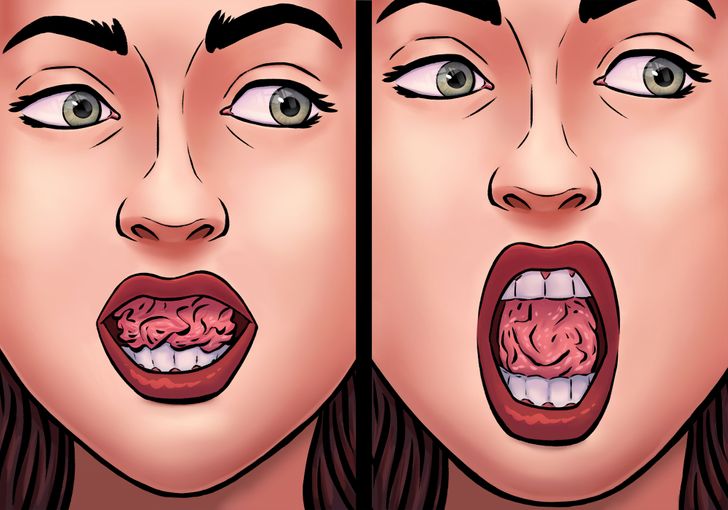
Nibbling on gum increases your heart rate, blood flow, and oxygen delivery to the brain. One of the positive effects of it is the cognitive boost we experience: it improves alertness, thought processing, decision making, and memory. Unfortunately, it doesn’t work long-term — it only works if you chew before or during particularly challenging tasks.
3. It aids in weight loss.
- Good: Gum can sometimes suppress our appetite. After chewing gum in the morning, people tend to feel less hungry. It’s both sweet and low in calories, so it might aid you in cutting back on snacks. It also increases energy spending, pumps up your metabolism, and makes you feel less weary after eating.
- Bad: But gum’s reputation as a diet aid can backfire in a bad way. The chewing motion and constant saliva tricks your brain into thinking you’re actually hungry. And mint gum pushes you to reach for junk food, rather than healthier options like fruit since it makes them taste horrible. Gum-chewers also tend to eat fewer meals per day, but load up on calories when they do eat.
4. It causes jaw problems.
Constant chewing can lead to a disorder that affects the jaw joints and muscles around it. Any jaw movement — eating, laughing, or even speaking — is accompanied by severe pain that sometimes spread to the neck and shoulders. The risk is especially high if you chew in moments of stress, as people tend to clench their teeth unconsciously when they’re nervous.
5. It influences the digestive system.
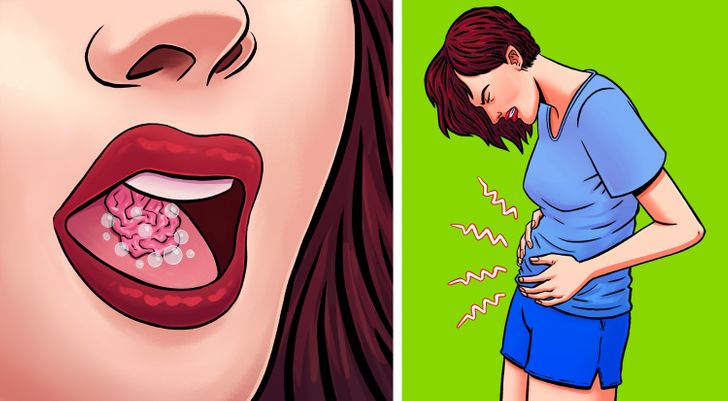
- Good: Extra saliva production when chewing gum effectively helps against morning and motion sickness. Some say it works better than medicine, reducing the chances of vomiting, abdominal discomfort, and nausea just as fast, while being considerably cheaper and more easily available.
- Bad: But woe to you if you have a sensitive stomach or indigestion. When you chew, you always swallow tiny sips of air and fill your stomach with gas that can lead to bloating. The sugar alcohols often used as sweeteners act as a purgative, causing cramping, abdominal pain, and diarrhea.
6. It reduces heartburn.
Following up a meal with chewing gum can lower the acid levels in your esophagus. Saliva flow dilutes and neutralizes acid after heavy food. This may help reduce acid reflux and heartburn.
7. It impacts your brain.
- Good: Surprisingly, gum-chewing possesses anti-stress, mood-improving superpowers. Munching this stuff reduces your levels of cortisol, the stress hormone, and the simple act of chewing is relaxing for most people. It dispels anxiety and fatigue and elevates our mood throughout the day.
- Bad: But the constant pressure on our jaw increases the amount and frequency of migraines and tension headaches. In the worst case, it can lead to chronic headaches. So, if you already have a predisposition toward migraines, it’s better to avoid gum altogether.
8. It prevents ear infections.
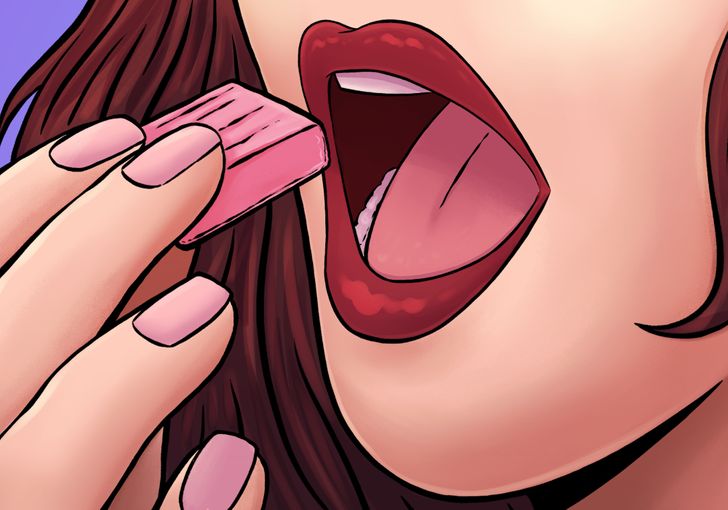
Do you like chewing gum? Have you ever noticed any changes in your body from it?
Comments
I love chewing gum, but if I get myself a pack then I just simply can't stop - I get one and then keep adding one more and one more to prolong the taste ?
ok, I thought chewing gum was bad
Related Reads
I’m Not Allowed to See My Grandkids Anymore Because I Refuse to Babysit Them

10 Creepy Stories That Will Make You Want to Look Back and Turn the Lights On

My DIL Disobeyed My House Rules — I Made Her Regret It

12 Real Stories Shrouded in Eerie Mystery

I Was Humiliated by My MIL, but Karma Had Other Plans

I Kicked My Stepdaughter Out — Her Behavior Was Turning Creepy

12 People Who Accidentally Found Hidden Cameras in Places Where They Shouldn’t Be

12 People Share the Most Shocking Gifts They Got for Christmas

20+ Bright Side Readers Who Faced So Much Sass They Still Haven’t Come to Their Senses

My Marriage Was Perfect Until My Mother-in-Law Interfered With Our Money

10 Dads Whose Unique Parenting Approaches Deserve a Standing Ovation

I’m on a Budget, So I Asked for My Money Back

